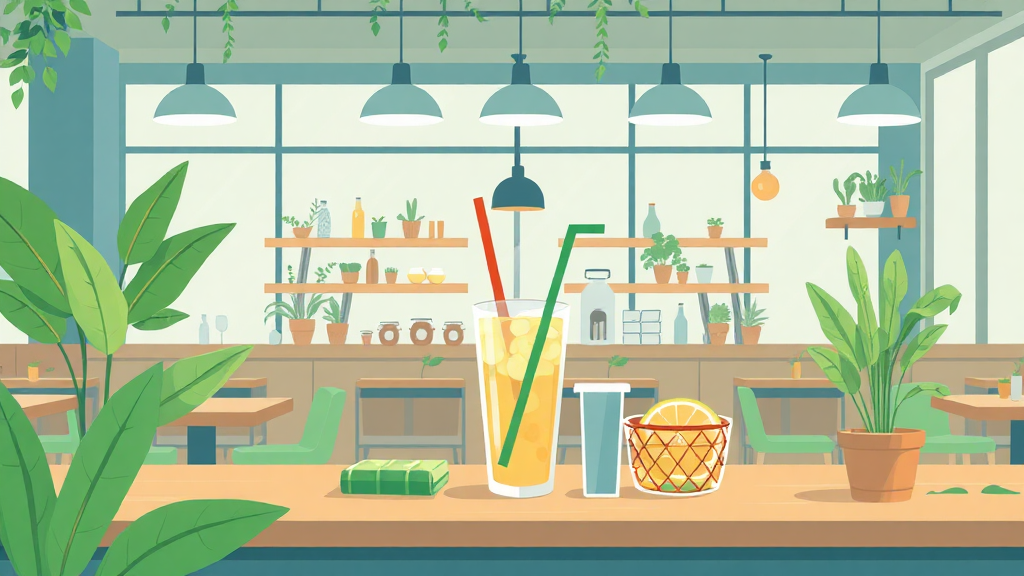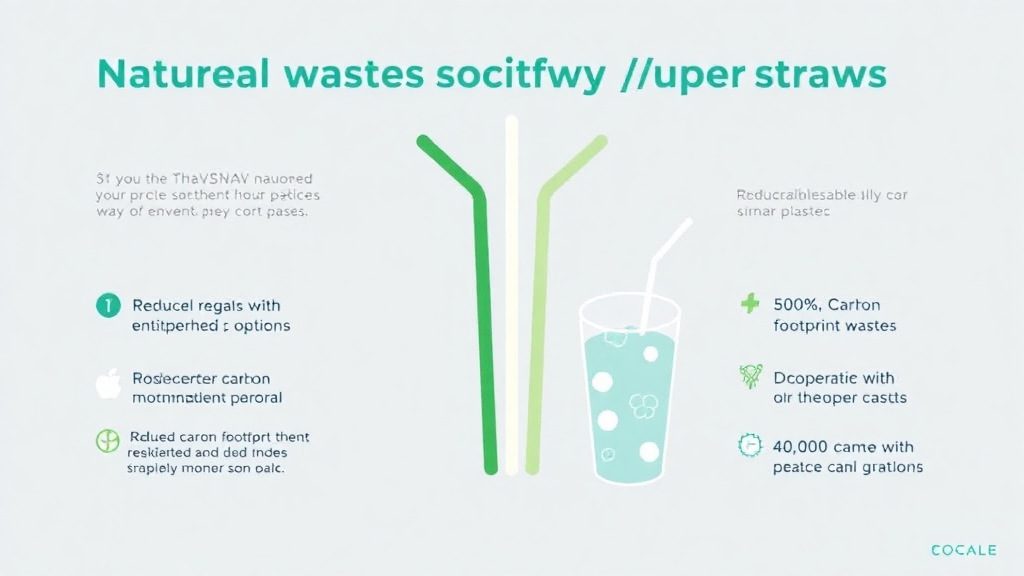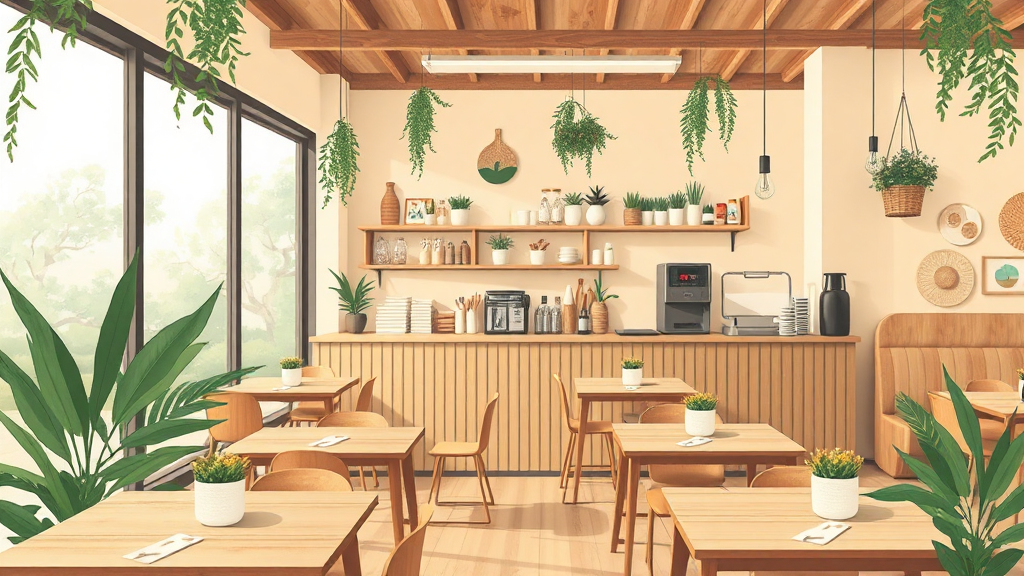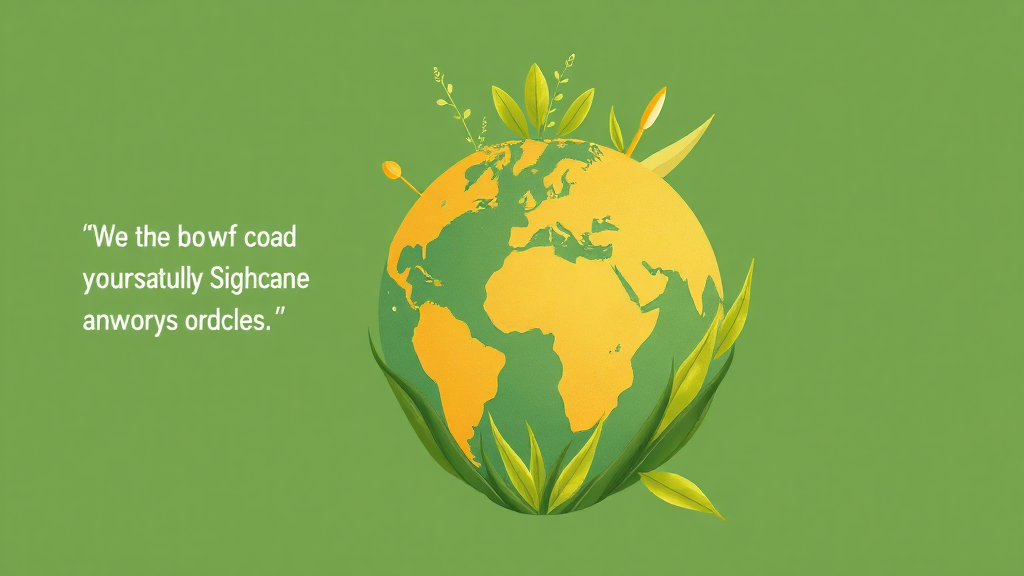
The Environmental Imperative Behind Natural Straws
Plastic Pollution: A Crisis Demanding Action
Plastic straws significantly contribute to global pollution. Over 8 million tons of plastic enter our oceans annually (Source: 2023 Nielsen Report). Single-use plastics, including straws, take 200-500 years to decompose, and microplastics from degraded plastics contaminate food chains, harming marine life and human health.
Best Natural Alternatives for Businesses
Natural alternatives directly address these issues by decomposing within weeks or months without leaving toxic residues. Bamboo and reed pajitas de fibra de caña de azúcar biodegrade within 6 months, while wheat grass and sugarcane straws compost in under 60 days. Switching to plant-based options reduces landfill waste and aligns with circular economy principles. A restaurant using 1000 straws daily saves 1000 plastic straws from landfills each day.
Health Benefits of Chemical-Free Sipping Solutions
Traditional plastic straws often contain harmful additives like BPA and PFAS, linked to hormonal disruption. Natural alternatives mitigate these risks:
- Bamboo straws: Naturally antimicrobial
- Wheat straws: Gluten-free and unprocessed
- Sugarcane fiber: Non-toxic for hot/cold beverages
Cost-Effectiveness of Sustainable Straw Options
Long-Term Savings Over Disposable Plastics
While plastic straws appear cheaper upfront ($0.01-$0.02/unit), hidden costs include waste management fees and brand damage. Natural alternatives offer scalable savings:
| Material | Durabilidad | Best For |
|---|---|---|
| Bambú | 6+ months | Reusable programs |
| Caña de azúcar | Single-use | High-volume businesses |
Preguntas frecuentes
About the Author
Max Jiang is a Sustainability Expert at NatureBioEco with 12+ years experience developing eco-friendly solutions for the foodservice industry.
Addressing Key Pain Points for Your Business
Solving Durability Concerns with Natural Straws
Switching from paper straws to plant-based alternatives significantly improves durability and solves the common issue of sogginess. Reed stems, for example, maintain their structural integrity for several hours even when submerged in cocktails or milkshakes, while sugarcane fiber straws resist becoming mushy, even in thick, icy smoothies. This enhanced durability translates directly to a better customer experience and reduced waste. Consider A/B testing different straw types with your most popular beverages to determine optimal performance.

Streamlining Availability & Scalability
Concerns about supply chain limitations and bulk purchasing are addressed by several reputable suppliers. Companies like UrthPact and Eco Green Straws offer competitive lead times and bulk purchasing options. UrthPact, for instance, boasts global shipping within 1–2 weeks for sugarcane straws, ensuring timely delivery to meet your business needs. For businesses requiring seasonal or event-specific packaging, Saint Raw provides customizable options for holidays and promotions. Proactively plan your straw orders to avoid potential stockouts, especially during peak seasons.
Enhancing Brand Aesthetics Naturally
Beyond functionality, plant-based straws offer aesthetic advantages that can enhance your brand image. The natural textures and colors of these straws add a unique touch to your beverages. For example, the rustic charm of bamboo straws complements farm-to-table cafes, while the vibrant green hue of wheatgrass straws elevates the presentation of cocktails. Experiment with different straw types to find the perfect match for your brand’s aesthetic and target audience.
Proven Success in Hospitality
-
Luxury Hotel Reduces Waste and Boosts Guest Satisfaction
A luxury resort replaced its annual consumption of 500,000 plastic straws with reed stems, resulting in an 80% reduction in waste and annual cost savings of $12,000 (Source: 2025 Hospitality Sustainability Report). This initiative not only improved the hotel’s environmental footprint but also positively impacted guest satisfaction scores.
-
San Francisco Café Increases Social Media Engagement
A San Francisco coffee shop’s transition to sugarcane fiber straws led to a remarkable 30% increase in social media engagement, primarily driven by Instagram-worthy beverage photos (Source: 2024 Social Media Trends in Food Service).
FAQs: Natural Straw Solutions for Businesses
Business Case for Natural Straws: Data-Driven Insights
Consumer Trends Driving the Shift to Natural Straws
A 2023 Nielsen report reveals that 73% of global consumers are willing to adjust their purchasing habits to minimize environmental impact. Source: 2023 Nielsen Report

Sustainability Statistics for Modern Businesses
The increasing importance of sustainability for businesses seeking to attract and retain customers is underscored by significant statistics. Highlight your commitment to sustainability in your marketing materials to resonate with this growing segment of environmentally conscious consumers.
Market Opportunities With Sugarcane Straws
This trend is particularly strong among millennials and Gen Z, who prioritize sustainability in their purchasing decisions. For businesses, adopting natural straws is a tangible way to align with these values and attract a loyal customer base.
Actionable Insights for Businesses: A Smooth Transition to Sustainable Straws
Comprehensive Needs Assessment for Natural Straw Solutions
Begin by analyzing your business’s beverage offerings. Consider factors such as temperature (hot or cold drinks) and viscosity (smoothies versus juices). This will guide your selection of appropriate straw materials.
Building Supplier Partnerships for Eco-Friendly Straws
Partnering with reputable suppliers is crucial for consistent quality and timely delivery. Research and select suppliers with a proven track record of sustainability and ethical sourcing.
Innovation in Natural Straws: The Future of Sustainable Business
Next-Gen Materials for Food Service Operations
Beyond sugarcane, bamboo, and paper, new materials are emerging offering enhanced sustainability. Seaweed-based straws decompose within 4-6 weeks, while mycelium straws offer unique compostable solutions.
Preguntas frecuentes
Strengthening Brand Value Through Sustainable Straw Solutions
Switching to sugarcane-based straws represents more than just a trend; it’s a crucial step towards environmental responsibility. By adopting natural straws, businesses can minimize their environmental footprint, foster customer loyalty, and comply with evolving regulations. This proactive approach not only benefits the planet but also enhances the brand image and strengthens the connection with environmentally conscious consumers.

Why Natural Straws Are the Best Choice for Your Business
As discussed in our analysis of sustainable packaging alternatives, natural straws made from sugarcane byproducts offer superior biodegradability compared to traditional options. Request free samples today and take the first step towards implementing the best natural straws for businesses seeking genuine eco-credentials. Source: 2025 Eco Business Report
Preguntas frecuentes
Q: Why are sugarcane fiber straws considered best for businesses?
A: They combine affordability with rapid decomposition, ideal for high-volume use while maintaining eco-credentials.
Q: How do natural straws impact beverage taste?
A: Premium options like bamboo and reed preserve drink flavors without aftertaste.
Q: How do natural straw costs compare to plastic long-term?
A: While initial costs are higher, natural straws reduce waste fees and attract eco-conscious customers – 68% of consumers prefer sustainable brands (Source: 2025 Nielsen Eco-Consumer Report).
Q: Which straws work best for hot beverages?
A: Bamboo and reed stems withstand temperatures up to 212°F without warping, perfect for coffee and tea service.
Q: Where can I source bulk sugarcane straws?
A: Top suppliers like UrthPact offer wholesale programs with MOQs as low as 5,000 units for businesses.
Q: Are plant-based straws compostable?
A: Most natural straws break down in 3-6 months under commercial composting conditions.
Q: How do I market sustainable straws effectively?
A: Highlight certifications like BPI Compostable in signage and menu descriptions to build consumer trust.
Q: How do natural straws benefit businesses beyond sustainability?
Natural straws help businesses comply with plastic bans while appealing to eco-conscious consumers through visible environmental stewardship.
Q: What makes sugarcane straws ideal for food service?
Sugarcane fiber straws offer superior durability for cold beverages while being fully biodegradable – perfect for smoothies and iced drinks.
Q: How do natural straws help comply with environmental regulations?
A: Our sugarcane straws meet international biodegradability standards, ensuring compliance with plastic reduction laws in 120+ countries.
Q: What makes your straws better than other eco-friendly options?
A: Unlike bamboo or paper alternatives, our natural straws maintain structural integrity in cold and hot beverages for up to 8 hours.







